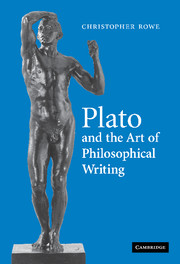Book contents
- Frontmatter
- Contents
- Preface
- Preliminaries: reading Plato
- THE DIALOGUES
- Introduction: The simile of the cave in the Republic
- 1 The Apology: Socrates' defence, Plato's manifesto
- 2 The Phaedo: Socrates' defence continued
- 3 ‘Examining myself and others’, I: knowledge and soul in Charmides, First Alcibiades, Meno, Republic, Euthyphro, Phaedrus
- 4 The moral psychology of the Gorgias
- 5 ‘Examining myself and others’, II: soul, the excellences and the ‘longer road’ in the Republic
- Appendix to Chapter 5: Socrates vs Thrasymachus in Republic I
- Interlude: A schedule of the genuine dialogues
- 6 Knowledge and the philosopher-rulers of the Republic, I: knowledge and belief in Book v
- 7 Knowledge and the philosopher-rulers of the Republic, II: the limits of knowledge
- 8 The Theaetetus, and the preferred Socratic–Platonic account of knowledge
- 9 The form of the good and the good: the Republic in conversation with other (‘pre-Republic’) dialogues
- 10 Republic and Timaeus: the status of Timaeus' account of the physical universe
- 11 Plato on the art of writing and speaking (logoi): the Phaedrus
- Epilogue: What is Platonism?
- Bibliography
- Index
3 - ‘Examining myself and others’, I: knowledge and soul in Charmides, First Alcibiades, Meno, Republic, Euthyphro, Phaedrus
Published online by Cambridge University Press: 22 September 2009
- Frontmatter
- Contents
- Preface
- Preliminaries: reading Plato
- THE DIALOGUES
- Introduction: The simile of the cave in the Republic
- 1 The Apology: Socrates' defence, Plato's manifesto
- 2 The Phaedo: Socrates' defence continued
- 3 ‘Examining myself and others’, I: knowledge and soul in Charmides, First Alcibiades, Meno, Republic, Euthyphro, Phaedrus
- 4 The moral psychology of the Gorgias
- 5 ‘Examining myself and others’, II: soul, the excellences and the ‘longer road’ in the Republic
- Appendix to Chapter 5: Socrates vs Thrasymachus in Republic I
- Interlude: A schedule of the genuine dialogues
- 6 Knowledge and the philosopher-rulers of the Republic, I: knowledge and belief in Book v
- 7 Knowledge and the philosopher-rulers of the Republic, II: the limits of knowledge
- 8 The Theaetetus, and the preferred Socratic–Platonic account of knowledge
- 9 The form of the good and the good: the Republic in conversation with other (‘pre-Republic’) dialogues
- 10 Republic and Timaeus: the status of Timaeus' account of the physical universe
- 11 Plato on the art of writing and speaking (logoi): the Phaedrus
- Epilogue: What is Platonism?
- Bibliography
- Index
Summary
In this chapter I set out to explore the notion of ‘examination’, exetazein, as the central term in Socrates' statement of his philosophical ‘mission’ in the Apology. I shall take as my starting-point the main version of that statement in the Apology, pairing it by way of anticipation with a contrasting passage from the Phaedrus – which will serve as an introduction to the apparently rather different notion of the self, and the soul, that seems to emerge, and with some radical consequences, in the Republic. The Phaedrus will be the topic of the fourth, short section of the chapter (the second will be an equally brief digression on learning as recollection); chapter 5 will then, inter alia, discuss the degree of difference between the conceptions of soul in the pre-Republic dialogues and in the Republic and after. (Chapter 4 will discuss related issues in the – pre-Republic – Gorgias.) The focus throughout will be on what Plato's Socrates understands by self-examination, which I take to contain the key to a proper interpretation of what it means for Socrates to ‘examine’ others.
Here is Socrates' ringing statement of the nature of his life's mission in the Apology
Perhaps someone might say ‘But Socrates – why shouldn't you be able to leave Athens and keep your mouth shut, living a quiet life?’ This is what it's most difficult of all to persuade some of you about. […]
- Type
- Chapter
- Information
- Plato and the Art of Philosophical Writing , pp. 122 - 142Publisher: Cambridge University PressPrint publication year: 2007

